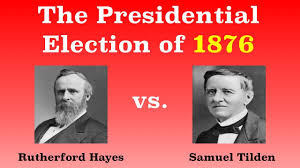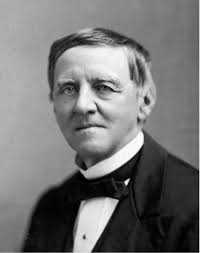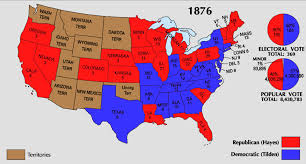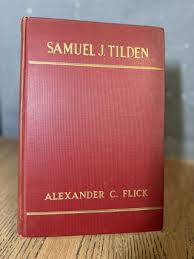Good Reads meta-data is 597 pages, rated 3.50 by 2 litizens.
Genre: Biography.
DNA: USA.
Verdict: The strength not to fight.
Tagline: Chads, what chads?

Who was Samuel J. Tilden (1814-1886)? And who cares?
He was a New York Democrat who supported Republican Abraham Lincoln, opposed slavery, and warred on Tammany Hall. In 1876 he was the Democratic nominee for U.S. President, described as dour, colourless, drab, and taciturn. Still he won the popular vote by a margin of more than 250,000. However, neither he nor his opponent, Rutherford Hayes, had a majority of electoral votes. To be exact, Tilden fell one single vote short of majority of electoral votes. One vote.

The result was a stalemate, that went on from 7 November to 7 March the following year, and the outgoing Republican-majority Congress resolved it by establishing a bipartisan, well, deeply partisan, Commission to adjudicate the electoral votes. Given that the Republican majority in Congress ensued this commission had a majority of dog-loyal Republicans the conclusion of its short deliberation was forgone, and Hayes took office.

Tilden observed all these shenanigans with a dignified silence and accepted the inevitable outcome with equanimity. Having lived through the Civil War, he had no wish to stir up a new conflict (pp 400-403). His agents did however secure a commitment from Hayes to reduce the postwar burden of Reconstruction on the Southern states in return for Tilden’s quiescence. But others in his party kept the controversy alive for years thereafter, and, inevitably, dragged Tilden into it over the next decade.
When the 1880 election approached, the Democratic nomination was Tilden’s for the taking, and given that the corruption of the 1876 election result was by then widely known, his election seemed assured. All that, it seems, was true. It was also true that he was not a well man, and had grown to like rustic retirement. Thus he forbade placing his name in nomination.
During the Civil War, Tilden did not profit himself by buying a rank or taking a quartermaster’s role, as did so many others in politics, e.g., the egregious Chester Arthur. He continued his legal practice and did fundraising for the war effort. However, he demonstrated colossally bad judgement in supporting George McClellan’s 1864 presidential campaign.
Here are a few things I learned about the man. He was easily bored and that together with his fragile health explains why he went from school to school without graduating, the Williams Academy, Yale University, Union College, and Columbia University. The curriculum in all these places was mostly Latin and Greek. He later entered law via apprenticeship.
He remained a bred in the bone hypochondriac all of his life, often speaking in a whisper to emphasise his fragility. Yet in law and business he set a cracking pace for those who worked for him.
He was a single-tasker; he did one thing at a time. When I think of a multi-tasker I always think of Napoleon. When Tilden’s political energies led to six years in public office he was honest and conscientious, one of those people who never put off anything until tomorrow. He would finish the job before going home. In this work he was oriented to the last detail.
By the way he does not seem to have had a home-life to which to go. There was no wife by age 40. By then his health seemed stable for the next twenty years and with his legal and political prominence, he was an eligible bachelor who was regularly invited to meet likely young ladies. While he enjoyed flirting with the bright young things, there was no advance on that. Make of that what you will. I did.
The text quotes several extracts from his legal briefs which often contained numerical data and statistical extrapolations, which he would then explain to the court with visual presentations. He seemed to be good at boiling down the mass of data he collected to something he could explain in very simple lay terms, because he won most of the contests. Contemporaries described his method as scientific and mathematical.
Even as a teenager he had found political work engaging, writing pamphlets, organising speakers, getting handbills printed, renting halls for rallies, and so on. He was inspired to do this by family friend and neighbour Martin van Buren, 8th US President (Ret.). He was involved in an endless round of campaigns for Democrats, usually in the backroom organising, only speaking when no one else was available for he was not imposing on the stump, being small and wheezy.
His success against Tammany Hall led to his election as Governor of New York State in 1874. Once ensconced he re-newed his attack on political corruption which flourished under the neglect of President Grant’s administration. Thus credentialed, he won the Democratic nomination in 1876.
After his 1876 concession he became a recluse in distant (!) Yonkers. (Sounds like a Neil Simon title that – ‘In Distant Yonkers.’) Unmarried and childless, he left a considerable fortune, earned as a corporate lawyer and his own sagacious investments, much of it to the New York City public library, in today’s dollars more than $110,000,000! Yes, he had always been an avid reader of history, biographies, novels, travelogues, and more.
The book concludes with a finely judged retrospective chapter on his life and career. It seems obvious that a biography should have such a chapter, but a surprising number do not, still less a chapter as comprehensive and clear as this one.
***
Alexander Flick professed history at Syracuse University and published many studies of American history, especially regarding New York State. Good Reads credits him with 43 titles!

On that election start with: Michael Holt, By One Vote (2008); William Rehnquist (yes, that Rehnquist), The Disputed Election of 1876 (2004); Roy Morris, Fraud of the Century (2003); Lloyd Robinson, Samuel J Tilden and the Stolen Election (2001); and Bill Severn, Samuel J Tilden and the Stolen Election (1968).

